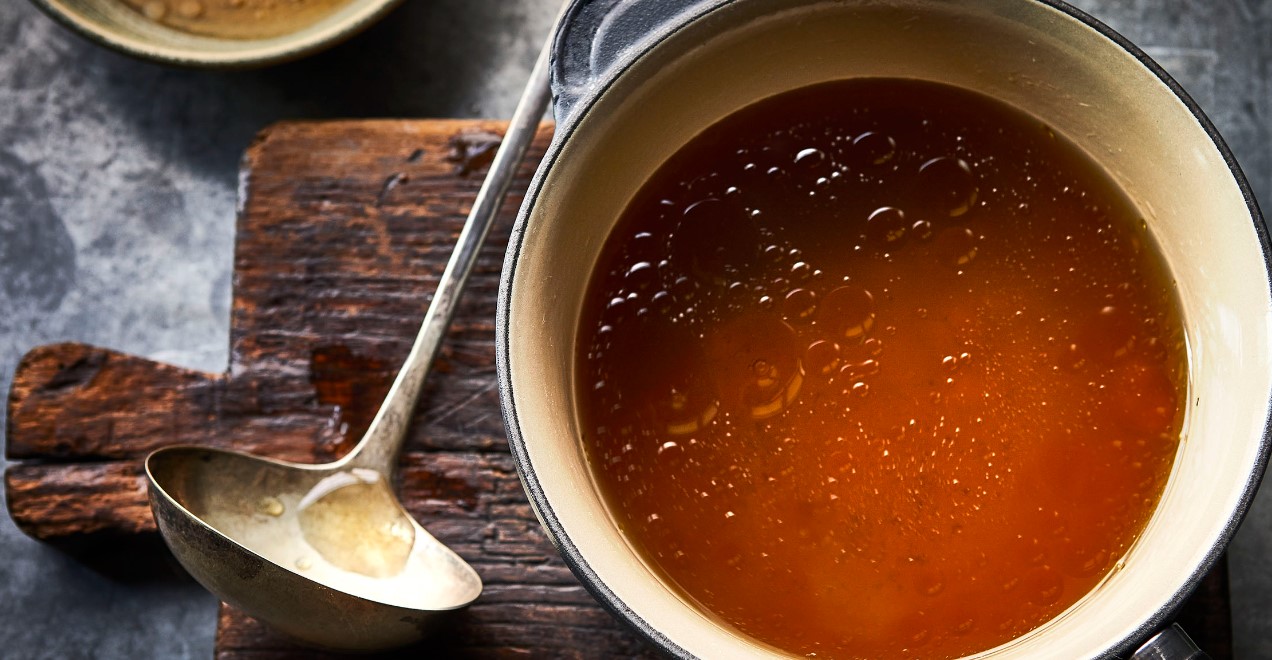Homemade beef broth can be used as a flavorful base for soups, stews, sauces, and various other dishes. The frozen broth can be thawed and used whenever needed.
ALLERGIES:
- SF (Shellfish-Free)
- GF (Gluten-Free)
- DF (Dairy-Free)
- EF (Egg-Free)
- NF (Nut-Free)
INGREDIENTS:
- 4-5 pounds beef bones and a few veal bones
- 1 pound of stew meat (chuck or flank steak), cut into 2-inch chunks
- Olive oil
- 1-2 medium onions, peeled and quartered
- 1-2 large carrots, cut into 1-2 inch segments
- 1 celery rib, cut into 1-inch segments
- 2-3 cloves of garlic, unpeeled
- Handful of parsley, including stems and leaves
- 1-2 bay leaves
- 10 peppercorns
INSTRUCTIONS:
- Heat the oven to 375°F (190°C).
- Rub olive oil over the stew meat pieces, carrots, and onions.
- Place the stew meat or beef scraps, stock bones, carrots, and onions in a large roasting pan.
- Roast in the oven for about 45 minutes, turning everything halfway through the cooking time.
- Transfer everything from the oven into the slow cooker.
- Cook on low heat for 6 hours.
- After cooking, remove the bones and vegetables from the pot.
- Strain the broth to remove any solids.
- Let the broth cool to room temperature and then refrigerate it.
- Once chilled, the fat will solidify on the surface. Discard the fat or reuse it as desired.
- Pour the strained broth into a jar and freeze it for future use.
NUTRITIONAL BENEFITS:
Beef broth, made from simmering beef bones and meat, offers several nutritional benefits. Here are some key points regarding the nutritional benefits of beef broth:
- Protein: Beef broth contains a significant amount of protein derived from the collagen and connective tissues present in the bones and meat used to make the broth. Protein is essential for building and repairing tissues, supporting immune function, and maintaining healthy hair, skin, and nails.
- Amino Acids: The long cooking process used to make beef broth breaks down collagen into amino acids, including proline, glycine, and glutamine. These amino acids are essential for various bodily functions, such as promoting gut health, supporting joint health, and aiding in the production of neurotransmitters.
- Minerals: Beef broth is rich in minerals such as calcium, magnesium, phosphorus, and potassium, which are extracted from the bones during the cooking process. These minerals are essential for maintaining strong bones, supporting nerve and muscle function, and regulating fluid balance in the body.
- Gelatin: Gelatin is a natural byproduct of collagen that forms a gel-like substance when the broth cools. It provides several health benefits, including supporting digestive health, improving joint function, and promoting healthy skin and hair.
- Hydration: Consuming beef broth can contribute to hydration as it contains water, electrolytes, and minerals. Staying hydrated is important for overall health and supports various bodily functions.
It’s important to note that the nutritional composition of beef broth can vary depending on the specific bones and meat used, as well as the cooking time and method. Additionally, the concentration of nutrients may be lower in store-bought beef broth compared to homemade versions that contain a higher proportion of bones and meat.
If you have specific dietary concerns or health conditions, it’s recommended to consult with a healthcare professional or registered dietitian to determine how beef broth can fit into your diet and to address any specific nutritional needs.


